- News
- Reviews
- Bikes
- Components
- Bar tape & grips
- Bottom brackets
- Brake & gear cables
- Brake & STI levers
- Brake pads & spares
- Brakes
- Cassettes & freewheels
- Chains
- Chainsets & chainrings
- Derailleurs - front
- Derailleurs - rear
- Forks
- Gear levers & shifters
- Groupsets
- Handlebars & extensions
- Headsets
- Hubs
- Inner tubes
- Pedals
- Quick releases & skewers
- Saddles
- Seatposts
- Stems
- Wheels
- Tyres
- Tubeless valves
- Accessories
- Accessories - misc
- Computer mounts
- Bags
- Bar ends
- Bike bags & cases
- Bottle cages
- Bottles
- Cameras
- Car racks
- Child seats
- Computers
- Glasses
- GPS units
- Helmets
- Lights - front
- Lights - rear
- Lights - sets
- Locks
- Mirrors
- Mudguards
- Racks
- Pumps & CO2 inflators
- Puncture kits
- Reflectives
- Smart watches
- Stands and racks
- Trailers
- Clothing
- Health, fitness and nutrition
- Tools and workshop
- Miscellaneous
- Buyers Guides
- Features
- Forum
- Recommends
- Podcast
TECH NEWS
Cannondale Slate - Eurobike First Ride Review
Of all the new bikes that have been filling the pages of road.cc over the past few months, arguably the one that has been getting the biggest response has been Cannondale’s new Slate, a gravel/adventure road bike rolling on 650b wheels and with a 30mm travel Lefty suspension fork.
Today I’ve been riding it. Not very far or for very long admittedly, just a quick blast around the woods and roads out the back of the huge Messe Friedrichshafen that (just about) contains Eurobike. Far from extensive enough for a proper review, but enough to give me a decent impression of how this new bike rides. And those first impressions are good: Cannondale has succeeded in delivering a bike that works both on the road and off it.
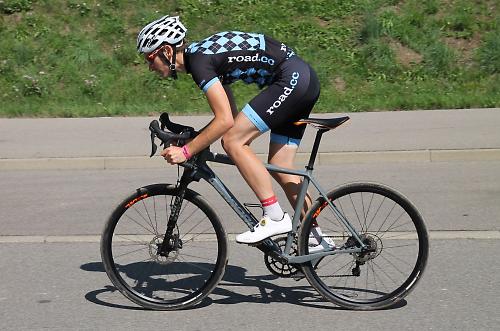
Cannondale’s Slate nears production
According to Cannondale, the Slate is designed primarily as a road bike, but one that is capable of entertaining your adventurous spirit if you want to take the path less travelled. Gravel tracks, byways, bridleways, that sort of thing. There has obviously been quite a lot of hype with this new breed of gravel and adventure bike recently, but let’s not get sidetracked with all that just now, let me just tell you about the ride experience, because that is what is really important here.
- Buyer’s guide to gravel and adventure bikes plus 11 of the best
So to put the Slate to the test, I searched out as many different surfaces to ride over as possible. The Eurobike organisers have helpfully laid out two test routes: one for mountain bikes and one for road bikes. I immediately headed for the mountain bike track. As you do. The off-road trail snakes up the hill. It’s narrow, surfaced with loose gravel, ideal for a mountain bike. A series of obstacles get increasingly technical. From rolling bumps, wooden planks half buried in the ground, steps and rocks, there’s a bit of everything here. I also go off-piste, and find some even better trails deeper into the woods.
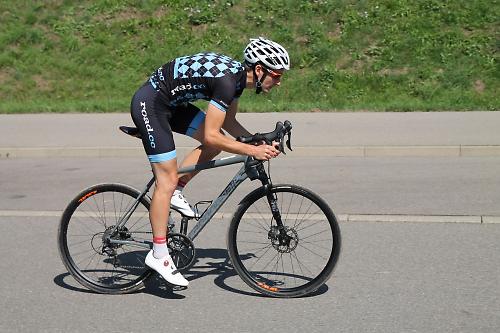
The Slate takes it all in its stride. The combination of the large volume tyres and the Lefty Oliver suspension fork really smooth out the bumps. My biggest curiosity about the Slate was the Lefty fork - would the 30mm of travel make any difference? When you push down on the handlebars, it’s clear there isn’t a lot of travel. It’s firm, too, with the recommended 175psi air pressure for my weight.
Hit an obstacle, however, and it becomes apparent that the Lefty fork lets you carry more speed over rough ground and through obstacles, much as you would expect of a bike with a suspension fork. Hit the road and the large knurled button on the top of the fork leg can be pressed to activate the lockout. In truth, I didn’t find it a necessity to lock out the fork on the smooth stuff. It’s not like it’s bobbing up and down madly when riding on the road. Even sprinting out of the saddle reveals it is well damped and composed.
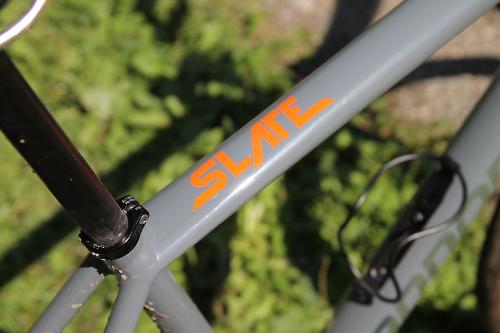
Handling is direct and there’s no unwanted flex from the Lefty - Cannondale has always proudly claimed the Lefty is stiffer than any other suspension fork on the market, and this holds true with the new Oliver. The available travel though is smooth. It doesn’t noticeably dive during heavy braking. Nor does it feel bouncy when sprinting up the road out of the saddle. It just works when you need it to, and doesn’t make a fuss when you don’t need it. It doesn’t ruin the road riding experience one bit.
Coming back down the mountain bike trail, on a swooping and curving bermed trail full of jumps and rollers, the Slate proves to be in its element. Gripping the drops, weight pushed back over the saddle, the Slate carves through the banked corners with the sort of poise that makes you feel completely at ease. It feels smooth and comfortable on this sort of terrain There’s no jarring impacts or wrist shattering feedback through the handlebars. It doesn’t feel nervous or out of its depth.
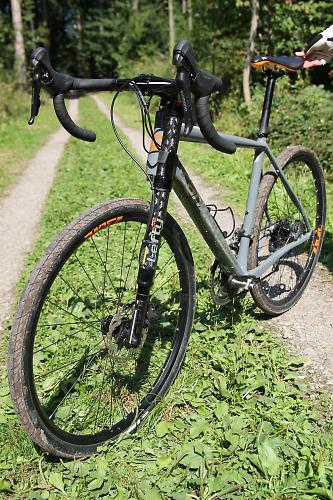
Grip from the Maxxis tyres is plentiful. More than you would expect from a cut slick. Push the tyres too hard and they will drift, but I was doing some daft things into the corners just to try and find the limits. Ride sensibly (where’s the fun in that?) and it’s fine. As for off-road capability, well it takes a greasy muddy trail to put the tyre out of its comfort zone. But by this point I’m well past the stage that a regular road bike wouldn’t have been frantically waving a white flag.
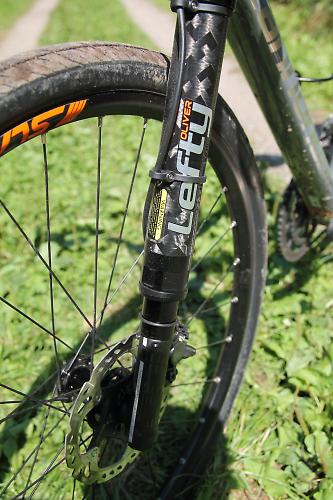
How about on the road? Well, the Slate feels surprisingly like a road bike should. It is nimble and light-footed. The position of the size large has a very normal road bike feel to it. The front isn’t terribly high. The wheelbase doesn’t feel madly stretched. Steering isn’t crazy fast or twitchy, in anything it’s quite slow. You can feel the effect of the bigger tyres when you turn the bars, but not in an overly negative way.
- First look: Cannondale Slate Ultegra + Video, photo gallery, spec and full range info
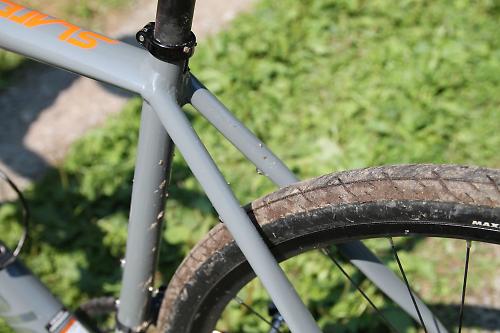
It rolls along a a decent speed, does the Slate. There’s no sluggishness getting it up to speed from a standing start, or accelerate up to higher speeds. With the 650b wheels wrapped with 42mm wide tyres, the outside wheel diameter is actually the same as 22mm tyre on a 700c wheel, according to Cannondale. So it’s no surprise that the rolling speed feels very similar to a conventional road bike.
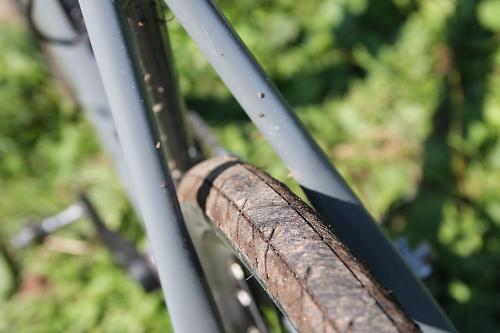
Cannondale wanted to give the Slate the performance and handling of a road bike. My brief ride reveals the Slate is able to easily hop between being a fast and sprightly road bike, and an entertaining and surprisingly capable off-road bike. What this short ride shows is that I can’t wait to give the Slate a proper, in-depth review.
The Slate technical details
The Slate’s aluminium frame has been developed using the same True Flow Modelling computer system Cannondale used to develop the new CAAD12, which has allowed the company to develop, using computer simulations, the best tube profiles and wall thicknesses for the different requirements of each part of the frame.
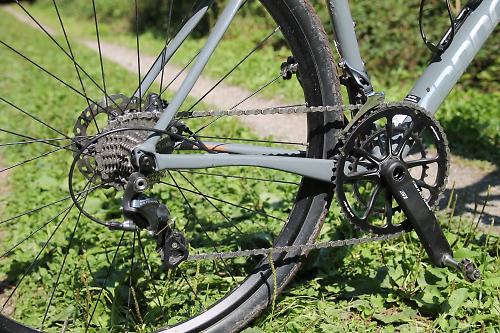
And there are some very shapely tube profiles, most particularly the chainstays and seatstays. The latter are wide and flat, which along with the slender seatstays should provide a smidgen of ride smoothness. The downtube is enormous, and the top tube is squashed where it meets the seat tube, reminiscent of the SuperSix Evo.
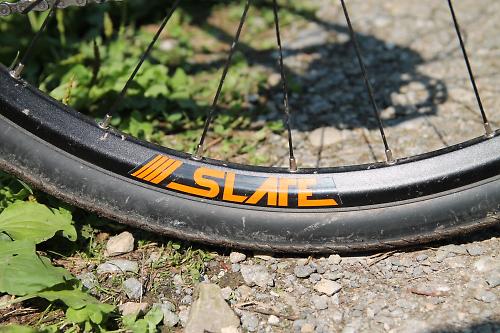
Tyre clearance, as you would expect, is generous. Cannondale says there’s space for up to a 42mm tyres. With the Lefty fork there aren’t the same limitations. The bike I was riding was fitted with Maxxis Detonator 1.5in (38mm) wide cut slicks. Cannondale will also be fitting bikes with the more expensive Panaracer Pari-Moto tyres too.
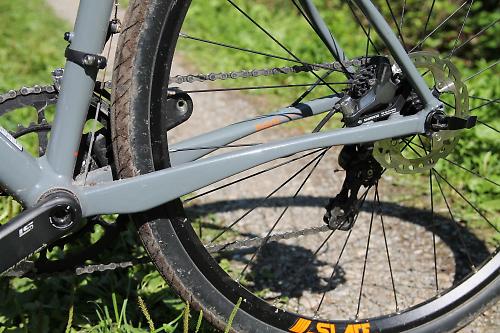
At the dropouts Cannondale has used a Syntace 142x12mm bolt-thru rear axle. The Lefty has a bolt-thru axle as well. There are hidden mudguard eyelets on the frame, which leaves the back of the frame looking very clean without any mudguards fitted. The Slate features internal cable routing, and it’s compatible with mechanical and electronic groupsets - using modular ports that are neatly positioned.
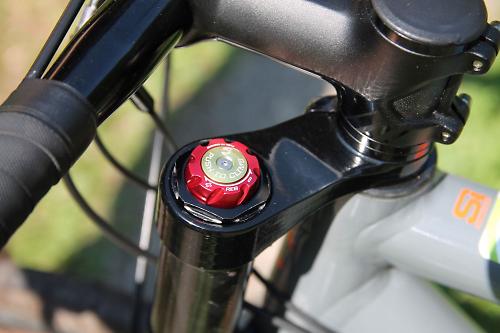
There will be three bikes available when it goes into production. When that actually is, we don’t yet know. Bikes will be priced from £2,499 for a Shimano 105 build up to £2,995 for SRAM Force CX1.
I was riding the £2,799 Shimano Ultegra model. It partners a mechanical drivetrain with hydraulic disc brakes. Cannondale’s own Si chainset is used, along with new Slate branded aluminium rims and a Fabric saddle atop an aluminium seatpost.
David worked on the road.cc tech team from 2012-2020. Previously he was editor of Bikemagic.com and before that staff writer at RCUK. He's a seasoned cyclist of all disciplines, from road to mountain biking, touring to cyclo-cross, he only wishes he had time to ride them all. He's mildly competitive, though he'll never admit it, and is a frequent road racer but is too lazy to do really well. He currently resides in the Cotswolds, and you can now find him over on his own YouTube channel David Arthur - Just Ride Bikes.
Latest Comments
- chrisonabike 2 sec ago
Pretty sure a lot of that "more space for motor vehicles" was because fewer motor vehicles (also marginally "smaller motor vehicles")....
- David9694 46 min 59 sec ago
I get the impression he represented himself, came over as a bit of an ass and received a ban, when a lawyer might have got him spared that.
- Rendel Harris 50 min 3 sec ago
Well if you ever get the chance and you feel yourself flagging give me a shout, happy to put in a shift.
- Rendel Harris 51 min 47 sec ago
Would the Gravaa system work with inserts? I don't know technical ins and outs of the system but at a guess I would think that the amount of valve...
- Laz 58 min 14 sec ago
OMG- that's so self centred....what about the brotherhood and sisterhood of enjoying a ride and sharing a happy wave with a fellow rider out...
- thax1 1 hour 25 min ago
Cycliq certainly seemed to let a lot of people down in the early days. I held off until the 12 Sport came out, but have been impressed....
- ktache 1 hour 26 min ago
My better half seems to like giving me pressies of Rapha clothing. I am wearing their casual hoodie right now, and very nice it is too. First off...
- thax1 1 hour 36 min ago
Push on through foot numbness and you then arrive at agonising foot cramp....
- Destroyer666 2 hours 14 min ago
Oh dear, to your own lack of understanding. I was not referring to your vague generalisation of "people", I was referring to a particular...
- chrisonabike 3 hours 35 min ago
Easy one that: it wasn't "so much traffic" before the cyclist was there! That queue had been building up behind the cyclist since the lane was...




























Add new comment
24 comments
Did anyone invest coming I around the C2W threshold and I'm seriously tempted...
What's wrong with just using a CX bike for this purpose? Anyone who has watched any CX racing at all can testify they work in the mud and mine is a fine road machine. You can play around with tyres to get the same balance discussed in this article.
@eschelar
the MC (master cylinder) in a hydraulic disc brake lever controls fluid displacement and incorporates timing ports to control the open/return stroke of the brake, as well as hosting the fluid expansion diaphragm which is essentially open to the atmosphere.
Adding another brake lever further down the hose would just cause a fluid leak as the fluid sitting in the MC above would just leak out of the lower lever's open diaphragm
Good to hear the positive review, have the SRAM Force CX1 on order (in much nicer black on black with purple bling), hoping to have it in next month or two.
Seems like a great little bike, should be fun
Does it need a Lefty/single-sided-mount specific front wheel? I imagine the forces on the hub and spokes potentially would be a bit different to a conventionally mounted wheel?
A specific hub yes but the load on the rim and spokes are no different to a conventional wheel
its a real quirky thing and if cannondale's only intention was to get publicity then it has worked. It does feel a bit like the answer to a question nobody asked though.
So how many Cannondale Garmin will be on one at Paris-Roubaix 2016?

Seems to me what we really need in British (or more generally Northern European) conditions is not a road-gravel bike but a road-mud bike. Tyres would be the limiting factor, methinks.
I can't wait for this bike. I want to put some frame bags on this thing and go campy out in the bush.
Somewhere else says:
"With a 405mm stay and a 71.5º head tube angle [on a size 56], you come in with a 1015mm wheelbase"
Bit slack/long (15mm longer than a Synapse), but I assume they know what they're doing.
Use of 650b allows 400mm chainstays with fat tyres.
"According to Cannondale the Slate’s 650bs shod with 42mm tyres gives the same outer wheels circumference as a 700c road wheel with a 23c tyre. "
Finally some thinking outside the box.
What's the wheelbase?
It's pretty much the same concept as 27.5+ for mountain bikes: fit an extra fat tyre to a wide 650b rim and its about the same OD as a 29" MTB tyre but wider... AKA semi-fat, chubby etc.
Genius or desperate marketing ploy? You decide
Nice bike and concept
- Does it do better then a standard cyclocross bike with slick tyres?
- The Koga Beach racer makes for even wider tyres and 29- er wheels, but no suspension.
Seems a surprise that they didn't opt for secondary brake levers on the tops, to me that would increase the off road potential. Maybe that's because they see it "primarily as a road bike"?
Shame we haven't got the huge gravel roads that parts of the US enjoy to fully exploit this sort of bike. It's still high up on my list of wanted bikes though, I'm sure I can find a regular use for one....Cyclocross maybe? With a change of chainset obviously.
Just no.
I might be wrong but I don't think you can use supplementary brake levers with hydraulic brakes.
You could probably engineer a system, but they'd basically need a second "master cylinder" surely?
Why couldn't you set up a hydraulic system with a secondary lever? There's no reason that the hydraulic system couldn't take it. In fact, it would probably be easier to do that than with a cable based system.
not sure there is true, it sems quite plausible to have a second piston on a hydraulic system. Haven't heard of any on the market, but if the demand is there, it could be done. a second cyclinder would not need the expansion provision.
I hope they bring a cheaper one out without the lefty fork. A race bike feel but with bigh-chamber tyres would be perfect for me.
What About front guard mounts?
I've got some perfect road / trails for this. Can I not have it in the civil service grey? Maybe some type of splinter came pattern ... like Sagans S-works bike.
Very cool! I've just bought a super six evo...perhaps a slate is in my future